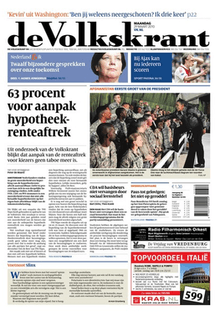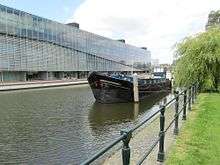de Volkskrant
de Volkskrant (Dutch pronunciation: [də ˈvɔlkskrɑnt]; The People's Paper) is a Dutch daily morning newspaper. Founded in 1919, it has a nationwide circulation of about 250,000.
 Front page of de Volkskrant on 29 March 2010 | |
| Type | Daily newspaper |
|---|---|
| Format | Compact |
| Owner(s) | DPG Media |
| Editor-in-chief | Pieter Klok |
| Founded | 2 October 1919 |
| Political alignment | Centre-left[1] |
| Language | Dutch |
| Ceased publication | 4 October 1941 |
| Relaunched | 8 May 1945 |
| Headquarters | Jacob Bontiusplaats 9 |
| City | Amsterdam |
| Country | Netherlands |
| OCLC number | 781575477 |
| Website | www |
| |
Formerly a leading centre-left Catholic broadsheet, de Volkskrant today is a medium-sized centrist compact. Pieter Klok is the current editor-in-chief.
History and profile

De Volkskrant was founded in 1919[2] and has been a daily morning newspaper since 1921. Originally de Volkskrant was a Roman Catholic newspaper[2] closely linked to the Catholic People's Party and the Catholic pillar. The paper temporarily ceased publication in 1941.[2]
On its re-founding in 1945, its office moved from Den Bosch to Amsterdam.[3] It became a left-wing newspaper in the 1960s, but began softening its stance in 1980.[3][4] On 23 August 2006 the Volkskrant published its 25,000th edition.
In 2010, Pieter Broertjes completed his 20-year tenure as editor-in-chief.[5] In 2013 de Volkskrant was awarded the European Newspaper of the Year in the category of nationwide newspapers.[6]
Ownership
De Volkskrant was part of PCM Uitgevers N.V., a publishing company which also owned NRC Handelsblad, Algemeen Dagblad, and Trouw. Until 1 January 2003 the newspaper Het Parool was part of PCM Uitgevers too.
In 2009 PCM Uitgevers was taken over by DPG Media (known as De Persgroep until 2019), a Belgian publishing company.
Free newspaper
In October 2006, Volkskrant announced it intended to start publishing a free version of its paper, targeting young people.[7] Its competitors were to have been Metro and Sp!ts, two other free dailies. However PCM gave no permission for this plan so it had to be retracted. Instead PCM intended to produce a free newspaper together with investor Marcel Boekhoorn,[8] although PCM later withdrew from the project and Boekhoorn started the free daily De Pers using his own resources. A year later PCM started its own free paper DAG, that had a short life and went digital after another year.
Circulation
In 2001 the circulation of De Volkskrant was 335,000 copies.[9] The daily circulation of the paper was 326,000 copies in 2002, dwindling to some 235,000 in 2011, which nevertheless makes it the Netherlands' third-biggest newspaper, after De Telegraaf and Algemeen Dagblad. The paper has since then heavily lost circulation.
Typeface
The typeface Capitolium News by Gerard Unger (2006) has been the main type used in de Volkskrant since 2 December 2006.
References
- Domevscek, Eveline (September 2006). "Politieke Kleur Bekennen" (PDF). Cite journal requires
|journal=(help) - Cordula Rooijendijk (2005). That City is Mine!: Urban Ideal Images in Public Debates and City Plans, Amsterdam & Rotterdam 1945-1995. Amsterdam University Press. p. 23. ISBN 978-90-5629-382-6. Retrieved 9 December 2014.
- Martin Sommer (23 August 2006). "Zelfbewust op zoek". de Volkskrant (in Dutch).
- Original citation: "Hoogtepunt en tevens laatste oprisping van het linkse levensgevoel was de beruchte Koninginnedagkrant van 1 mei 1980. [..] De rellen kwamen er en de Volkskrant solidariseerde zich met het oproer. [..] Zo bleef de Volkskrant de progressiviteit trouw, zij het langzamerhand steeds meer in homeopathische verdunning."
- "Philippe Remarque stopt als hoofdredacteur van de Volkskrant". Het Parool (in Dutch). 18 April 2019.
- "15th European Newspaper Award". Adnative. 15 November 2013. Archived from the original on 4 June 2015. Retrieved 2 December 2014.
- "Dutch newspaper De Volkskrant to launch free version for younger readers". International Herald Tribune. 29 March 2009. Retrieved 31 January 2012.
- "PCM en Boekhoorn samen in gratis krant". Trouw (in Dutch). 18 October 2006.
- Adam Smith (15 November 2002). "Europe's Top Papers". campaign. Retrieved 7 February 2015.